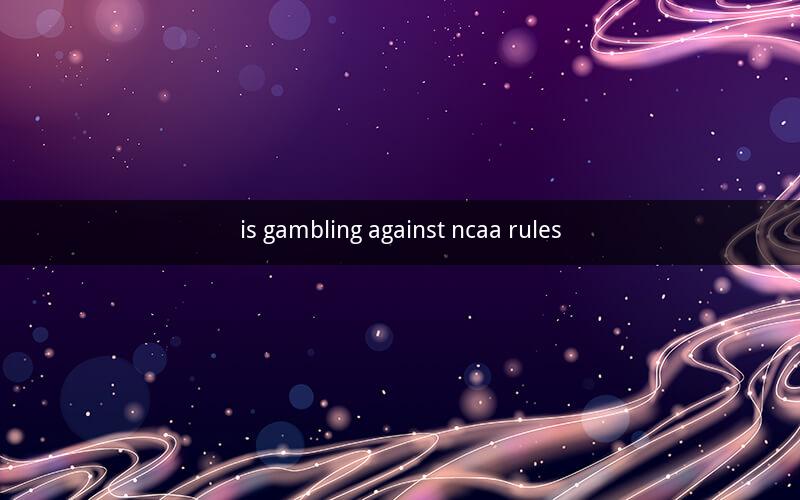
Table of Contents
1. Understanding NCAA Gambling Rules
2. The Importance of Compliance
3. Common Violations
4. The Consequences of Breaking NCAA Gambling Rules
5. Protecting Student-Athletes
6. Educational Programs and Awareness
7. The Role of Technology in Monitoring
8. Collaboration with Betting Companies
9. The Impact on College Sports
10. The Future of NCAA Gambling Regulations
---
1. Understanding NCAA Gambling Rules
The National Collegiate Athletic Association (NCAA) has stringent rules in place to prevent gambling activities among its student-athletes and personnel. Understanding these rules is crucial for anyone involved in college sports. The NCAA defines gambling as "the placing of a bet or wager of any kind on any competitive event, including any event involving student-athletes," regardless of whether the bet is legal or not.
2. The Importance of Compliance
Compliance with NCAA gambling rules is essential for maintaining the integrity of college sports. Gambling can lead to unethical behavior, corruption, and a negative impact on the reputation of the NCAA and its member institutions. By adhering to these rules, colleges can ensure fair competition and protect the well-being of their student-athletes.
3. Common Violations
Several common violations related to gambling can occur within the NCAA. These include:
- Betting on NCAA sports: Student-athletes, coaches, and staff are prohibited from betting on any NCAA sports, including their own teams.
- Receiving money for betting: It is illegal for student-athletes to receive any money for betting on NCAA sports.
- Gathering information for betting: Student-athletes cannot gather or use information that could be used for betting purposes.
- Participation in gambling pools: Student-athletes cannot participate in any type of gambling pool, including office pools or fantasy sports.
4. The Consequences of Breaking NCAA Gambling Rules
The consequences of breaking NCAA gambling rules can be severe. For student-athletes, this may include suspension, expulsion, or loss of eligibility. Coaches and staff may face penalties such as fines, suspension, or termination of employment. In some cases, the entire team or program may be subject to sanctions.
5. Protecting Student-Athletes
The NCAA is committed to protecting student-athletes from the dangers of gambling. This includes providing educational resources, implementing monitoring systems, and offering support to those who may be at risk.
6. Educational Programs and Awareness
Educational programs play a crucial role in preventing gambling among student-athletes. These programs may include workshops, seminars, and informational sessions that discuss the risks and consequences of gambling. By raising awareness, colleges can help student-athletes make informed decisions.
7. The Role of Technology in Monitoring
Technology has become an essential tool in monitoring gambling activities. Colleges can use software to track betting patterns and flag suspicious behavior. This helps to identify potential violations and take appropriate action.
8. Collaboration with Betting Companies
The NCAA has been exploring collaborations with betting companies to monitor and prevent gambling activities. These partnerships can provide valuable data and resources to help colleges enforce gambling rules.
9. The Impact on College Sports
Gambling can have a significant impact on college sports. It can lead to corruption, decreased fan trust, and a negative image for the NCAA. By enforcing gambling rules, the NCAA can help maintain the integrity of college sports.
10. The Future of NCAA Gambling Regulations
The future of NCAA gambling regulations may involve further collaboration with betting companies, increased use of technology, and ongoing education for student-athletes and staff. As the landscape of gambling continues to evolve, the NCAA must adapt its rules to address new challenges.
---
10 Related Questions and Answers
1. Q: Can student-athletes bet on sports outside of the NCAA?
A: Yes, student-athletes can bet on sports outside of the NCAA, but they must adhere to the rules and regulations of the governing bodies of those sports.
2. Q: What should a student-athlete do if they suspect they have been approached by a gambler?
A: Student-athletes should report any suspicious contact to their coach or athletic department immediately.
3. Q: Can coaches discuss betting strategies with their teams?
A: No, coaches are not allowed to discuss betting strategies or encourage betting among their teams.
4. Q: Are fantasy sports considered gambling under NCAA rules?
A: Yes, fantasy sports can be considered gambling if they involve betting on the outcome of real-life athletic events.
5. Q: Can student-athletes be penalized for not reporting gambling activities?
A: Yes, student-athletes can be penalized for not reporting gambling activities, as this is considered a violation of NCAA rules.
6. Q: Are parents allowed to bet on their child's college sports team?
A: Parents are not prohibited from betting on their child's college sports team, but they should be aware of the potential consequences.
7. Q: Can NCAA officials be punished for gambling?
A: Yes, NCAA officials can be punished for gambling, as this is considered a violation of their employment contract.
8. Q: Is there a specific hotline for reporting gambling violations?
A: Some colleges have established hotlines for reporting gambling violations. Students and staff should check with their athletic department for information.
9. Q: Can gambling violations affect a college's eligibility for NCAA championships?
A: Yes, gambling violations can lead to sanctions that may affect a college's eligibility for NCAA championships.
10. Q: How can colleges ensure that their student-athletes are not participating in gambling activities?
A: Colleges can ensure compliance by implementing strict gambling rules, providing educational programs, and using technology to monitor betting activities.